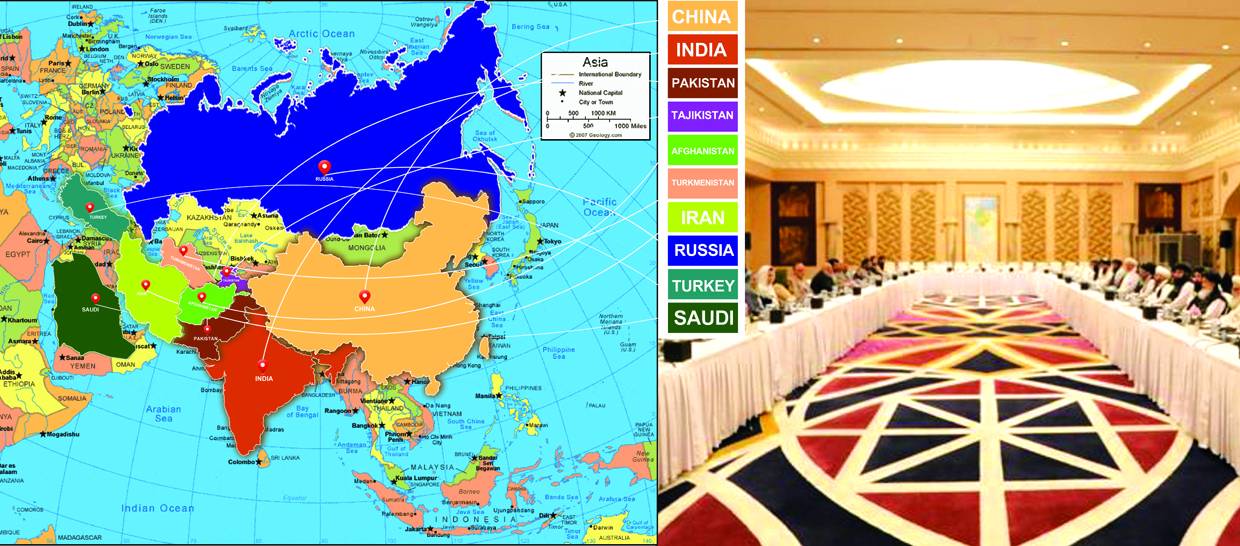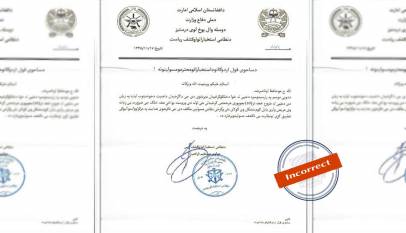No regional convergence on peace process, Govt claim incorrect
KABUL (Pajhwok): The government claim evolving a regional consensus has proved wrong in the backdrop of contradictory assertions from some government officials, experts and the Taliban recent trips to the regional countries.

While President Ghani, Foreign Minister Atmar talked claiming regional consensus evolved on Afghan peace process, but the Taliban have recently travelled to Moscow, Tehran, Islamabad, Turkmenistan making it difficult to believe if regional consensus existed on the Afghan peace process.
This comes as the second round of talks is underway in Doha since January 7 without any major breakthrough in firming up the agenda of the peace talks. For more than 10 days, both sides have not held any substantial meeting to discuss the future course.
Claim: Regional consensus evolved on peace
President Mohammad Ashraf Ghani said on July 6, 2020 that national and regional consensus existed on ending the war in Afghanistan. Strong support from regional and neighbouring countries would help Afghanistan achieve durable peace, he hoped.
Foreign Minister Mohammad Hanif Atmar also said on April 11, 2020 that regional consensus on the Afghan peace process had been strengthened.
Najia Anwari, spokesperson for the State Ministry of Peace, also said there was regional consensus on the Afghan peace process but it needed be further strengthened and consolidated.
Deputy presidential spokesperson Dawa Khan Menapal told Pajhwok Afghan News on January 29, 2021 that national, regional and international consensus existed on Afghan peace process.
He said: “The entire region stand by the narrative of the Afghan government, its people and the existing system. Regional countries don’t want the revival of Taliban’s Emirate, all advocates for democracy and support it and the entire region is on one page for peace in Afghanistan.”
Fact check:
Taliban’s political office members’ recent trips to regional countries raise questions about government officials’ recent statements on regional consensus.
Recently, Taliban’s Qatar office head Mullah Abdul Ghani Baradar, at the head of a delegation travelled to Iran and his assistant Mohammad Abbas Stanikzai travelled to Russia. These trips happened after the new US administration said they were reviewing the peace deal with the militant movement.
Stanikzai told reporters in Moscow on January 29 that if President Ashraf Ghani relinquished power and allowed the creation of a new Islamic government, the Taliban were ready for peace.
Deputy presidential spokesperson Dawa Khan Menapal, without naming any country, said Stanikzai’s demand was the wish of Afghanistan’s enemies. The rebel group sought to scuttle the existing system and push the country 30 years back, he alleged.
Presidential advisor Shah Hussain Murtazavi also reacted to Stanikzai’s statement and wrote on his facebook page. “The Taliban conducted political maneuvers through their trips to Moscow and Tehran and the main purpose is to convey messages to Washington.”
He said: “Russia and Iran also want to show the US that they are on friendly terms with the Taliban and could use them for advancing their interests in the region.”
According to Murtazavi, President Ghani’s tenure and powers had been defined by the constitution and Stanikzai is speaking on behalf of a foreign intelligence network.”
But Rizwan Murad, head of the first vice-president’s media office, said on January 30: “It is not surprising that Punjab, Taliban, Russia and Iran and some groups inside the country hold similar views about Afghanistan.”
He believed: “Their animosity is not towards President Ghani or the Afghan state. Their enmity is with today’s Afghanistan and its future. Every Afghan has the right to criticise the government every moment. But it will amount to treason to align with the enemy, anti-state slogans and strengthening them.”
Some reports suggest the US-Taliban peace agreement has worried India. Iran did not participate in the signing ceremony for the US Taliban pact in Doha. As the US and Taliban came closer, Pakistan was also worried. The agreement worried India, an arch rival of Pakistan, and slammed it as one-sided.
In the opening ceremony for intra-Afghan talks representatives from Russia, China, the US and 30 other countries participated physically and virtually.
Asked why his country did not take part in the opening ceremony, Iranian Foreign Minister Jawad Zarif told Tolo News on December 22, 2020: “We had issued a statement on intra-Afghan talks before the event and talked to Dr. Abdullah Abdullah, head of the High Council for National Reconciliation (HCNR). We believe that Trump used Afghanistan for his election and we will see to what extent it will harm the US.”
International affairs experts believe lack of trust in the region and differences among regional countries hamper regional consensus on the Afghan peace process.
One expert, Abbas Faraso, said: “It seems that for different reasons and due to differences among regional countries, consensus on the peace process could not be reached. This is why conflict continues to escalate in Afghanistan. Achieving a peaceful settlement has become more complicated.”
Faraso said: “Disputes between India and Pakistan, economic and political rivalry between China and Indian, Iran and Saudi Arabia and Riyadh-Ankara problems, and more importantly the US-China tension and other regional factors impede the development of regional consensus on the Afghan peace process.”
About what Iran and India want in Afghanistan, he said Tehran strived to curtail America’s role in the region by strengthening its influence in the war-torn country.
On India, he said under its economic development mantra, New Delhi wanted to undercut Pakistan’s influence in Afghanistan. India was worried about Pakistanis backed government in Afghanistan, he added.
Following these statements, if countries in the region, such as Iran and Saudi Arabia, Pakistan and India, Turkey and Saudi Arabia, do not link their differences with Afghanistan their genuine support would have a significant impact on peace efforts.
Central Asian countries role
According to Frasoo, Central Asian countries are among the most active players in the peace and war in Afghanistan. They have so far played a more influential role in peace than any other country in the region.
He added: “The role of these countries is related to the cultural and economic interests they have in Afghanistan. At the same time, these countries are mostly in contact with elements that not only have no ideological connection with the Taliban, but have fought against them in the past. These countries believe that lasting peace and stability in Afghanistan can pave the way for the development of trade and economic exchanges in the region.”
Analysts Javid Lodin and Janan Mosazai, in a joint article on the Atlantic Council website, wrote: “To date, though most countries in the region have voiced support for the Afghan talks, yet there is no substantial regional convergence on the process itself or, more importantly, its end state. On the surface, this lack of convergence is a reflection of the fragmented relationships across the region. This fragmentation is exacerbated by divisive issues, such as differing views on the presence of American and NATO forces in Afghanistan, as well as a plethora of regional and global rivalries and hostile relations. Fundamentally, there is a chronic inertia at the heart of regional politics that prevents meaningful dialogue, understanding, and cooperation on issues of shared concern.”
For decades, they wrote, regional politics has been bedeviled by two mutually reinforcing factors: A set of fraught relationships within the region, and the effect of global tensions and rivalries that are played out at the regional level.
The Pakistan-India conflict is a prominent example of the former, while the tensions between the United States and regional powers, such as Iran, China and Russia, of the latter. The accumulated, disempowering impact of these two factors lies behind the strategic inertia we are experiencing today.
There are valid reasons for regional powers to be concerned about the situation. Even in the aftermath of a successful political settlement in Afghanistan, the region will be faced with a hst of threats and challenges, from global terrorism and instability to organised crime and environmental and public health risks, to economic hardship and under-development.
While American and European support will remain important, lasting peace in Afghanistan and effective regional responses to shared challenges and threats can only be guaranteed by the region itself.
Political analyst Wadir Safi held a similar view and said no regional consensus existed on the peace process and every regional country strived for its safeguarding its own interests.
Najeeb Azad, another expert of political affairs, said the government viewed official trips to regional countries and similar visits of officials from other nations as political consensus. He said no substantial regional consensus existed on Afghan peace process.
The Taliban Qatar office spokesperson Dr. Mohammad Naeem, without giving a clear answer to a question regional consensus, said: “Everyone could understand the situation. We are committed to peace, independence of the country and public prosperity and well-being is our aim under an Islamic government. We call on all segments to ensure coordination and cooperation for achieving this goal.”
Outcome: The Afghan government claims regional consensus on peace process existed, but statements from some government officials disputed the matter. Experts say no regional consensus exists on the Afghan peace process because regional countries have deep political, economic and security disputes and every country strives for protecting and promoting its national interest.
Verdict: Regional consensus an incorrect claim
On January 11, Pajhwok released another report, saying the claim regarding the existence of national consensus was exaggerated because a number of key political parties are not part of the ongoing peace process and have strong reservations about it.
Ahmad Sohaib Hasrat
Hits: 3554
Letter regarding ban on roaming during night is fake
KABUL (Pajhwok): The Ministry of Defence (MoD) and an expert have rejected the letter rega…



